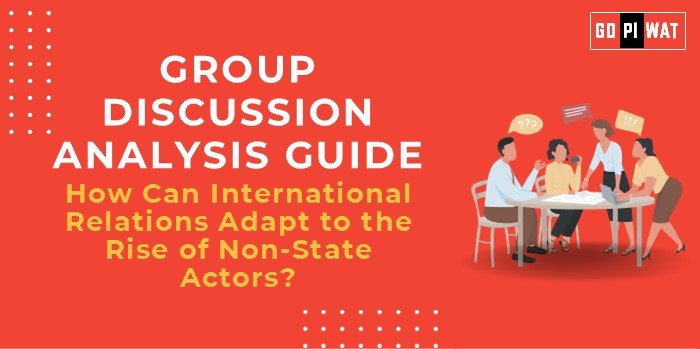📋 Group Discussion (GD) Analysis Guide: How Can International Relations Adapt to the Rise of Non-State Actors?
🌐 Introduction to the Topic
- 📌 Context Setting: The rise of non-state actors such as multinational corporations, NGOs, terrorist groups, and digital platforms challenges the traditional state-centric paradigm of international relations. Their growing influence impacts diplomacy, security, and global governance.
- 📖 Topic Background: Historically, states were the primary players in international relations. However, globalization, technological advancements, and economic interdependence have empowered non-state actors to shape global agendas. For instance, corporations like Google influence data privacy debates, and NGOs like Greenpeace champion climate action.
📊 Quick Facts and Key Statistics
🌍 NGOs in Global Governance: Over 10,000 international NGOs actively participate in UN deliberations.
💰 Economic Power of Corporations: Apple’s market cap ($3 trillion in 2024) surpasses the GDP of most countries.
⚔️ Terrorism’s Impact: Non-state groups caused $90 billion in economic damages worldwide in 2023.
🌐 Internet’s Role: Digital platforms reach 5 billion users, reshaping public opinion and policy globally.
💰 Economic Power of Corporations: Apple’s market cap ($3 trillion in 2024) surpasses the GDP of most countries.
⚔️ Terrorism’s Impact: Non-state groups caused $90 billion in economic damages worldwide in 2023.
🌐 Internet’s Role: Digital platforms reach 5 billion users, reshaping public opinion and policy globally.
👥 Stakeholders and Their Roles
- 🏛️ Governments: Regulate, collaborate, or counter non-state actors’ influence on policies.
- 📈 Corporations: Shape global trade and innovation, often influencing regulatory frameworks.
- 🌱 NGOs: Advocate for issues like human rights and environmental conservation.
- 🌍 International Organizations: Provide platforms (e.g., UN) for integrating non-state actors into formal diplomacy.
🏆 Achievements and Challenges
✨ Achievements:
- 🌍 Climate Action: NGOs drove the Paris Agreement forward by lobbying for stricter emission targets.
- 💻 Digital Transformation: Corporations like Microsoft lead global digital literacy initiatives.
- 🌍 Public Health: Bill & Melinda Gates Foundation played a critical role in eradicating diseases like polio.
⚠️ Challenges:
- 🔐 Security Threats: Terrorist groups and cybercriminals exploit state vulnerabilities.
- 📉 Accountability Issues: Corporations and NGOs often lack transparency in global governance.
🌍 Global Comparisons:
- ✔️ Success: Estonia’s collaboration with tech firms on cybersecurity is a benchmark.
- ❌ Challenges: Failures like the collapse of international agreements on arms regulation highlight difficulties.
Case Study: The Paris Climate Agreement demonstrates successful NGO-state collaboration for a global cause.
📢 Structured Arguments for Discussion
- ✅ Supporting Stance: “The inclusion of non-state actors fosters innovation and addresses global issues with agility.”
- ❌ Opposing Stance: “Non-state actors often prioritize profit or ideology over collective global welfare.”
- ⚖️ Balanced Perspective: “While non-state actors provide innovative solutions, their lack of accountability remains a concern.”
🧠 Effective Discussion Approaches
- 🎯 Opening Approaches:
- “With 5 billion internet users, digital platforms redefine diplomacy and public policy globally.”
- “Unlike the Cold War era, today’s conflicts involve non-state actors wielding equal influence.”
- 🤝 Counter-Argument Handling:
- Present examples like the positive impact of global NGOs, counterbalanced with challenges like cybersecurity threats.
📊 Strategic Analysis of Strengths and Weaknesses
- 🌟 Strengths:
- Innovative solutions to global problems.
- Ability to mobilize resources quickly.
- ⚠️ Weaknesses:
- Accountability gaps.
- Risk of undermining state sovereignty.
- 📈 Opportunities: Multi-stakeholder governance frameworks, partnerships for sustainable development.
- ⚡ Threats: Escalation of non-state-led conflicts, cybersecurity vulnerabilities.
🎓 Connecting with B-School Applications
- 💼 Real-World Applications: Understanding non-state actors aids in framing policies for global business, cybersecurity, and diplomacy projects.
- 📚 Sample Interview Questions:
- “How can corporations balance profit motives with their role in global governance?”
- “What challenges do non-state actors face in influencing international policies?”
- 💡 Insights for B-School Students:
- Importance of cross-sectoral collaboration.
- Role of public-private partnerships in addressing global challenges.


